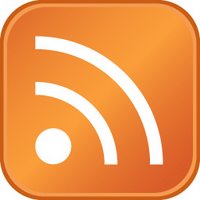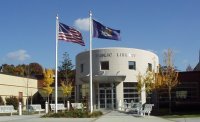#8 Make Life Really Simple with RSS and a Newsreader
Listen to this podcast [5:15]--> powered by ODEO
FYI: This is the longest podcast in the program.
 You’ve heard of RSS? You’ve seen those small funny tags on websites? You’ve heard co-workers and acquaintances swear by it, but still have no idea what RSS is? Well don’t worry, according to a recent survey you’re still in the majority, but this is changing rapidly. In the information world, RSS is not only revolutionalizing the way news, media and content creators share information, but it also is swiftly changing the way everyday users are consuming information.
You’ve heard of RSS? You’ve seen those small funny tags on websites? You’ve heard co-workers and acquaintances swear by it, but still have no idea what RSS is? Well don’t worry, according to a recent survey you’re still in the majority, but this is changing rapidly. In the information world, RSS is not only revolutionalizing the way news, media and content creators share information, but it also is swiftly changing the way everyday users are consuming information.
RSS stands for “Really Simple Syndication” and is a file format for delivering regularly updated information over the web.
Just think about the websites and news information sources you visit every day. It takes time to visit those sites and scour the ad-filled and image-heavy pages for just the text you want to read, doesn’t it? Now imagine if you could visit all those information sources and web pages in just one place and all at the same time … without being bombarded with advertising… without having to search for new information on the page you’d already seen or read before… and without having to consume a lot of time visiting each site individually. Would that be valuable to you? Well, it’s available now through a newsreader and RSS.
This week’s discovery exercises focus on learning about RSS news feeds and setting up a Bloglines account (a free online newsreader) for yourself to bring your feeds together.
Discovery Resources:
Subscribe to Newsfeeds:
This is as easy as typing the blog URL into the subscribe field in Your Bloglines. Try it!
Then try adding a few other types of news feeds from news sources. (Select at least 3 from the sources below to subscribe to.)

How to find your public Bloglines URL:

In conclusion ...Here is link to the Library's public Blogline's account: http://www.bloglines.com/public/spl-23
Why have a public account? To share blog rolls with others, of course.
PS: Once you tackle this discovery exercise, you've tackled the most difficult one of the whole 23. :)
FYI: This is the longest podcast in the program.
RSS stands for “Really Simple Syndication” and is a file format for delivering regularly updated information over the web.
Just think about the websites and news information sources you visit every day. It takes time to visit those sites and scour the ad-filled and image-heavy pages for just the text you want to read, doesn’t it? Now imagine if you could visit all those information sources and web pages in just one place and all at the same time … without being bombarded with advertising… without having to search for new information on the page you’d already seen or read before… and without having to consume a lot of time visiting each site individually. Would that be valuable to you? Well, it’s available now through a newsreader and RSS.
This week’s discovery exercises focus on learning about RSS news feeds and setting up a Bloglines account (a free online newsreader) for yourself to bring your feeds together.
Discovery Resources:
- CNET Video: RSS – Feel the Need for Feeds (3:32) – a good over view of what RSS is and the benefits to users.
- Feed Me: A gentle introduction to Internet feeds - a good tutorial from Palinet, a library cooperative
- Using Bloglines Tutorial (how to keep up with dozens of blogs everyday) – This online tutorial walks you through how to setup a Bloglines account and add newsfeeds. Follow Steps 1 to 3 to set up your Bloglines account. Steps 4 – 9 are optional and cover how to subscribe to different types of feeds (podcasts, Flickr albums, etc)
- Adding RSS Feeds to Bloglines - A short YouTube video that has been created showing how to add feeds.
- Additional Bloglines news feed subcription information (screenshot image)
- Your co-workers - tap into their knowledge or work through your discovery process together.
- Follow the discovery resources above to learn more about RSS and newsreaders.
- Create a free online Bloglines account for yourself and subscribe to at least 7 newsfeeds to your reader. See Using Bloglines Tutorial steps 1-3 for instructions.
Subscribe to Newsfeeds:
This is as easy as typing the blog URL into the subscribe field in Your Bloglines. Try it!
Then try adding a few other types of news feeds from news sources. (Select at least 3 from the sources below to subscribe to.)
- The Library's Learning 2.0 Blog Post Feed
- The New York Times RSS Feeds
- Reader’s Club new review feeds
- Unshelved - Library cartoon feed
- Go to a co-worker's blog and subscribe to their "posts feed" to automatically read each new posting they make. (The subscribe link should be found on their main blog page.)

Create a post in your blog about this exercise.
Optional: If you're up to the challenge, you can provide the URL address to your public bloglines account (find where to find this below)
Don’t know what to blog about? Think about these questions:
What do you like about RSS and newsreaders?
How do you think you might be able to use this technology in your work or personal life?
How can libraries use RSS or take advantage of this new technology?
How to find your public Bloglines URL:
- Click on the Share tab within your Bloglines account:

- Scroll down the right screen pane and locate the public URL (see screenshot)
- Be sure to add this as part of your post to demonstrate your completion of this activity.
In conclusion ...Here is link to the Library's public Blogline's account: http://www.bloglines.com/public/spl-23
Why have a public account? To share blog rolls with others, of course.
PS: Once you tackle this discovery exercise, you've tackled the most difficult one of the whole 23. :)

